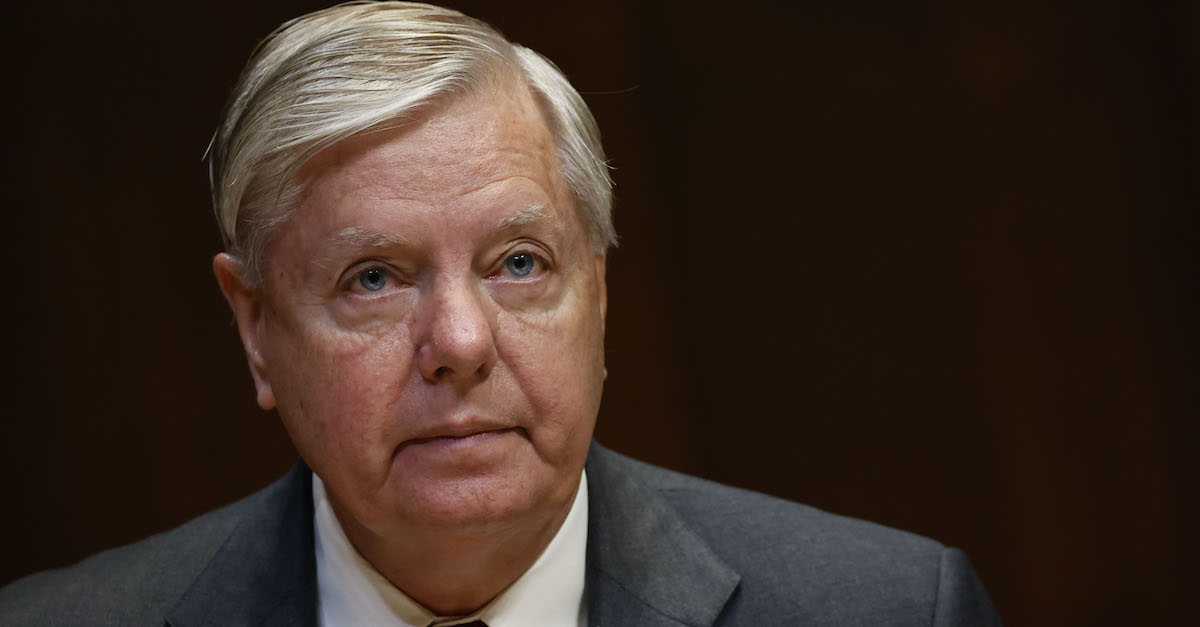
Sen. Lindsey Graham, a Republican from South Carolina, during a Senate Appropriations Subcommittee hearing in Washington, D.C., on Wednesday, May 25, 2022.
On the same day a Georgia judge ordered him to testify at a special grand jury investigation, Republican Sen. Lindsey Graham jockeyed to move his subpoena fight to South Carolina. The Donald Trump loyalist argues that forcing him to cross the border to the Peach State for weeks to help investigate the former president will interfere with his duties as a senator.
In a 13-page memorandum, Graham argues that he’s “immune” under the U.S. Constitution’s speech or debate clause, a portion of which states that members of Congress “shall not be questioned in any other place.”
“The Clause provides Senator Graham both an immunity and privilege in this context because the testimony sought relates to matters within the legislative sphere,” Graham’s attorneys E. Bart Daniel and Matt Austin wrote. “Sovereign immunity also precludes state court process against Senator Graham given the acts occurred within his official capacity.”
Fulton County District Attorney Fani Willis (D) wants to question Graham about two calls he made to Georgia Secretary of State Brad Raffensperger (R), asking him about reexamining certain absentee ballots cast during the 2020 presidential election in a way that might favor Trump. During the conversation, Graham “made reference to allegations of widespread voter fraud in the November 2020 election in Georgia, consistent with public statements made by known affiliates of the Trump Campaign,” according to the ruling ordering his testimony. Graham characterized the statements as the type of “legislative activity” protected by the speech or debate clause.
“Senator Graham’s contact with Georgia officials referenced in the Certificate falls within the ‘legislative sphere’ because it was to gather information relevant to his oversight responsibilities as Chairman of the Senate Judiciary Committee and given his obligations under the Electoral Count Act of 1887,” his memo argues. “The Certificate and public news reports explain that Senator Graham discussed a matter of public importance — absentee voting — with the Georgia Secretary of State.”
The senator claims that he, like other elected officials, expressed concerns about the security of absentee voting, insisting that he wasn’t trying to tip the scales in Trump’s favor.
“Senator Graham did not inject himself into Georgia’s electoral process, and never tried to alter the outcome of any election,” his lawyers wrote. “The conversation was about absentee ballots and Georgia’s procedures.”
Former federal prosecutor Jennifer Rodgers noted that the legal issue turns on whether Graham was acting as a senator rather than as a Trump surrogate.
“Merely claiming the former can’t be enough to thwart a subpoena,” Rodgers told Law&Crime. “There are powerful federalism issues at play here too that suggest federal courts should think hard before effectively giving federal officials complete immunity.”
Rodgers, who is also a CNN legal analyst, does not imagine a federal judge will give Graham’s arguments much traction, but she believes that the end goal may be running out the clock.
“So I suspect at the end of the day he loses this battle, but it certainly delays things a bit, which of course was a big part of the point of it,” Rodgers said.
Fulton Superior Court Judge Robert McBurney ordered Graham’s in-person presence in a Georgia courtroom for the special grand jury from Aug. 2 to Aug. 30. Graham bristled at the time frame, which starts while the Senate will be in session.
“That appearance would inhibit—or even potentially prohibit altogether—Senator Graham from exercising his constitutionally prescribed duties in the Senate on behalf of the People of South Carolina,” his memo says. “During this time, Senator Graham is in South Carolina and returning to Washington, D.C. for legislative business until the next state work period begins.”
Willis opened her special grand jury probe in January. The panel has been probing Trump’s efforts to overturn his electoral defeat in Georgia, including his phone call urging Raffensperger to “find 11,780 votes.” Raffensperger refused and rejected Trump’s false claims of widespread election fraud.
Read Graham’s memorandum below:
(Photo by Ting Shen – Pool/Getty Images)